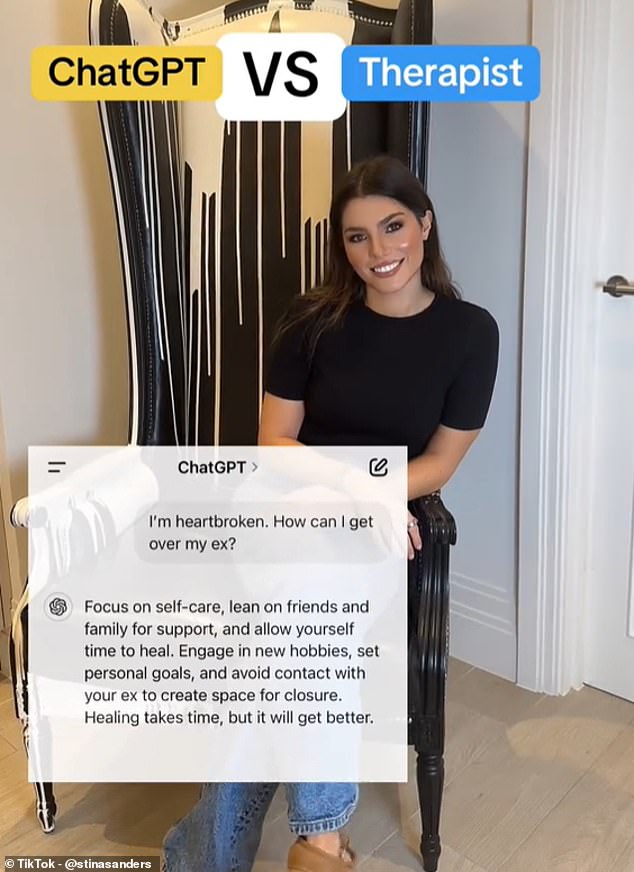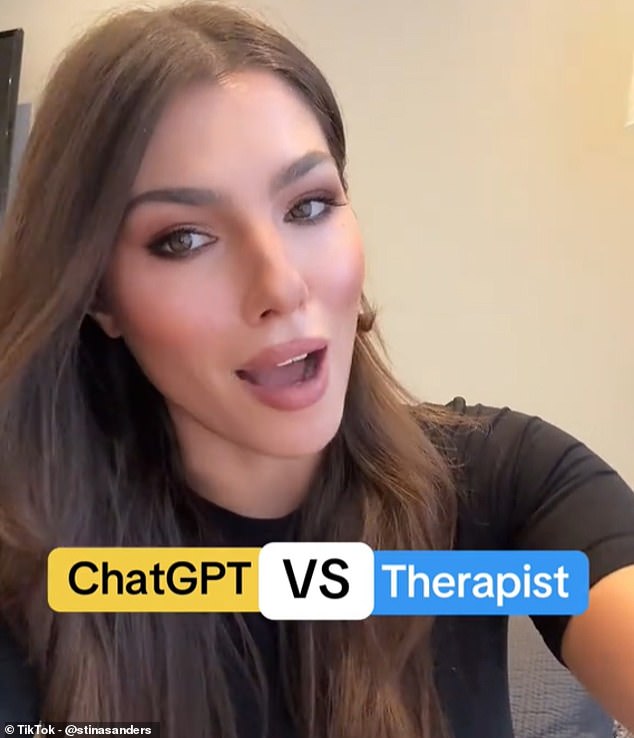Table of Contents
With more people turning to AI to help manage daily tasks, can it do more than simplify our schedules?
Can it really counsel a troubled mind, help heal a weary soul, or even mend a broken heart? Stina Sanders, a relationship therapist, decided to put that idea to the test.
The London-based expert, who goes by @stinasanders on TikTok, recently shared a video in which he takes on ChatGPT to show who gives better advice.
Recruiting her boyfriend as a fictitious client, Sanders’ partner first asks him a series of questions related to typical relationship problems, from heartbreak to arguments to evaluating whether a partner is really “the one.”
Sanders’ boyfriend then asked AI the same questions, word for word, and the results were revealing, leaving Sanders surprised by the insights ChatGPT offered.
The relationship expert warned that while ChatGPT is great for giving advice, it can pose risks; However, it could also be a complement to therapy by bridging the gap between sessions.
Sanders found that while the tool can never replace the empathy and nuanced understanding that therapists provide, it can provide immediate assistance and emotional check-ins, making mental health care more continuous and consistent.
Here’s how ChatGPT and Sanders stacked up against each other in the relationship advice showdown:
Can AI really counsel a troubled mind, help heal a weary soul, or even mend a broken heart? Stina Sanders (pictured), a relationship therapist, decided to put that idea to the test.
‘I’m heartbroken…how can I forget my ex?’
Therapist
In the clip, the relationship therapist suggested three ways to help move on after a disturbing breakup.
Sanders advised focusing first on self-care: getting enough sleep, eating well, drinking plenty of water and exercising.
Second, she suggested surrounding yourself with your loved ones and “really engaging with your support network during this difficult time.”
Her third tip is to distract yourself by “constantly doing things you love or enjoy doing,” as well as getting rid of any physical reminders of an ex, such as photos and text messages.
ChatGPT
Meanwhile, the AI tool provided an accurate and comforting response, advising: “Focus on self-care, lean on friends and family, and take time to heal.”
‘Engage in new hobbies, set personal goals, and avoid contact with your ex to create more space for closure. Healing takes time, but it will get better.’

In the video, the relationship therapist suggested three ways to help move on after a disturbing breakup, while the AI tool provided an accurate and comforting answer.
‘How do I know if someone is right for me?’
Therapist
Sanders provided a thoughtful response, highlighting that the question of “the one” often has more to do with mutual compatibility and growing together than a perfect match.
He emphasized the importance of communication, shared goals, and the ability to overcome challenges as a couple.
She said: “You would really feel very safe emotionally, with them and with yourself.”
‘The most important thing is that there would be shared respect: they respect each other, there is no abuse and, in general, the relationship is very healthy.
Sanders added: “If they’re ‘the one’ for you, you’re on the same page: you’ll have a lot of shared values and morals.”
ChatGPT
ChatGPT provided a short, concise but effective answer; describing the key signs of a healthy relationship, such as sharing values and communicating openly.
He advised: “They feel like a partner, not a project: they support your growth, share your values, communicate openly, and you feel at peace being yourself with them.” ‘The one’ complements your life, not completes it.’
My partner and I are still arguing… how can we solve it?

After looking at the responses generated by the AI tool, Sanders admitted that “Chat GPT definitely won”
Therapist
Sanders emphasized the importance of actively listening and understanding each partner’s emotional needs while working on the issue as a team.
She explained: ‘Firstly, you need to communicate, but you both need to actively listen to each other to really understand what the other is thinking and feeling.
“We have to approach this conflict as a team; it’s not about winning, it’s about working together.”
ChatGPT
Meanwhile, the AI tool suggested techniques for better communication, including active listening and addressing underlying issues instead of focusing on superficial disagreements.
He advised: ‘Focus on listening to understand, not responding. Discuss problems calmly, avoid blaming, and express your feelings using I statements.
“Consider setting aside time for open communication and, if necessary, seek couples therapy to resolve deeper conflicts.”
The results: Who gives the best relationship advice?
After looking at the responses generated by the AI tool, Sanders admitted that “Chat GPT definitely won.”
She said: “I feel like I’m under pressure. My boyfriend said: ‘You’ll be timed, so you’ll have to give your answers really quickly.’
‘I feel like the robot did a lot better than me. I feel like if I didn’t have the time constraint, my answers would have been a lot more thorough and a little more empathetic.’
She joked: “I think ChatGPT is good, but I don’t know if it has my charm.”
The therapist said that while it may pose risks, AI can help close gaps in care, offering accessibility to people who face barriers such as cost, location or long waiting lists.
Sanders cautioned that there are still significant risks to consider: issues such as data security and potential biases in artificial intelligence systems are major concerns.
AI also struggles to accurately identify crisis situations, which can be dangerous for vulnerable people.
He added: “And while AI can provide helpful suggestions, it lacks empathy, intuition, and the ability to navigate complex emotional dynamics, all of which are essential to supporting emotional healing.”
However, if carefully integrated, Sanders said AI can empower therapists rather than compete with them, ultimately improving outcomes for clients.


